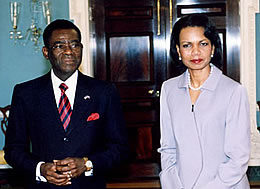War vs. Democracy: Untold Stories from the Lynch / Tillman Hearing
What does it mean to be a nation at war? Is it possible to exercise democratic control over a wartime government that dismisses honest criticism as unpatriotic? What should citizens do when members of their military not only commit crimes -- as happens during every war -- but also rely on propaganda to hide mistakes and to embellish or even create victories, as happened in the cases of Army Ranger Pat Tillman and Private Jessica Lynch?

Those are big questions, but a few things are clear. One is that the secrecy, deception and constraints sought by wartime administrations are anathema to the transparency, accountability and freedom necessary to democracy. As James Madison warned, "Of all the enemies of public liberty, war is perhaps the most to be dreaded, because it comprises and develops the germ of every other." Another truism is that citizens retain the right to receive information and provide guidance to their government during wartime. The last is that, while security concerns may legitimately restrict what information can be shared when, maintaining civilian oversight of war operations helps ensure that human rights standards are upheld. Perhaps the most important effort to provide oversight of ongoing U.S. wars was the April 24 Congressional hearing on battlefield misinformation.


